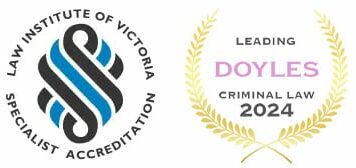Slades & Parsons is a Melbourne-based criminal law firm with extensive experience representing clients in complex Commonwealth (or federal) matters. These serious offences often involve national or international investigations and require strategic defence from lawyers who understand how the Commonwealth legal system operates.
We’re available 24/7 for urgent legal advice and representation. Early legal intervention can make all the difference.
What Are Commonwealth Offences?
Commonwealth criminal offences are governed by federal law enacted by the Australian Parliament in Canberra. The principal legislation is the Commonwealth Criminal Code Act 1995, which sets out the rules for criminal liability and applies across all Australian states and territories.
Unlike state-based offences, Commonwealth charges often relate to:
- Conduct that crosses state or international borders
- Offences against federal agencies or laws
- More complex investigations and federal prosecutions
Because of their scope, Commonwealth matters are often prosecuted in the higher courts and can involve sophisticated or large-scale criminal activity.
Why You Need a Specialist Commonwealth Offences Lawyer
Commonwealth charges are serious, usually investigated by the Australian Federal Police (AFP) and prosecuted by the Commonwealth Director of Public Prosecutions (CDPP). These matters often involve significant evidence, cross-jurisdictional processes, and strict sentencing rules under the Commonwealth Crimes Act.
Slades & Parsons has a strong track record in Commonwealth cases. Our lawyers understand the complexities of federal law and have extensive experience dealing with both the Australian Federal Police (AFP) and the Commonwealth Director of Public Prosecutions (CDPP).
We are skilled negotiators and seasoned advocates in both the County and Supreme Courts. Our team stays ahead of legislative changes affecting sentencing, including the continued availability of Recognisance Release Orders for Commonwealth offences.
When your future is on the line, you need lawyers who know this space inside out. Contact us today to schedule an appointment with one of our criminal defence lawyers in Melbourne to help you navigate the challenges of a Commonwealth criminal case.
Contact Us Today
Contact Slades & Parsons for help in navigating the legal process on Commonwealth offences. We’ll be back in touch shortly.
Types of Commonwealth Offences We Defend
Our firm represents clients facing a wide range of Commonwealth offences, including:
Drug Importation and Trafficking
Importing or exporting border-controlled substances or precursors under federal legislation.
Welfare and Tax Fraud
Cases involving Centrelink fraud, tax evasion, or dishonestly obtaining financial benefits.
Money Laundering and Commercial Crime
Allegations involving the concealment of criminal proceeds or large-scale financial crime.
Cybercrime and Telecommunications Offences
Charges involving hacking, identity theft, online fraud, cyberbullying, or illegal material transmission.
Human Trafficking, Slavery and Terrorism Offences
High-stakes, high-penalty charges prosecuted under specific federal legislation.
Environmental, Aviation, and Workplace Safety Crimes
Offences involving breaches of federal law in areas such as product safety, civil aviation, and WHS.
We also act in general crimes against the Commonwealth, including corruption, perjury, and failing to vote.
How We Can Help You
Every Commonwealth offence case begins with a thorough and confidential consultation. At this initial meeting, we’ll review your situation, explain the charges and potential outcomes, and help you understand your rights. From there, we begin building a tailored defence strategy designed to achieve the best possible result.
Our proven approach includes:
- Initial Consultation and Case Assessment
We’ll schedule a prompt meeting, either in person or remotely, to assess your case. We listen carefully, review available documents, and provide practical advice on what to expect. - Early Intervention and Investigation Support
Commonwealth matters often involve lengthy investigations. If you’re being questioned or investigated (even before charges are laid), engaging us early allows us to communicate with federal authorities on your behalf and protect your position from the outset. - Detailed Evidence Review
We closely examine the brief of evidence to identify weaknesses in the prosecution’s case, unlawful procedures, or breaches of your legal rights. - Negotiations and Strategic Advocacy
Where appropriate, we negotiate directly with the Commonwealth Director of Public Prosecutions (CDPP) to pursue withdrawal or downgrading of charges, particularly where evidence is weak or mitigating factors apply. - Court Representation and Defence Preparation
If the matter proceeds to court, our lawyers prepare rigorously. Whether it’s a bail application, pre-trial hearing or contested trial, we advocate fiercely to protect your interests. - Sentencing and Outcome Management
In sentencing scenarios, we prepare compelling submissions highlighting your background, prospects for rehabilitation, and any steps taken (such as restitution). Where available, we pursue Recognisance Release Orders to help clients avoid imprisonment.
We understand that facing a Commonwealth offence is overwhelming, but you’re not alone. With Slades & Parsons, you’ll have a dedicated team of criminal defence lawyers who guide you through every step with clarity, discretion, and strength.
Case Study -Fraud Charge and Recognisance Release Outcome
Our solicitors have a thorough understanding of Commonwealth offences and how they are litigated in the Victorian courts.
Ms Jasmine Pisasale appeared before the County Court of Victoria in relation to a Commonwealth matter involving $90,000.00 in welfare benefits that had been fraudulently obtained.
Our client had an impoverished background in Africa and had migrated to Australia as a refugee. She had obtained the benefits over a number of years in a misguided attempt to support her family. She had commenced making repayments to the government.
Our client was sentenced to 18 months imprisonment to be released immediately onto a Recognisance Release Order.
Speak to a Commonwealth Criminal Lawyer Today
If you’re under investigation or facing charges under Commonwealth law, don’t delay. These matters are serious, and the right legal advice early on can significantly change the outcome.
Slades & Parsons has over 35 years of experience defending serious criminal charges, including complex federal offences. Our team is responsive, strategic, and ready to help.
Book in for a confidential consultation today with an experienced Commonwealth offences lawyer and allow us to help guide you through your case.
Slades & Parsons are available to take your call 24 hours a day.
We can provide more information on Commonwealth criminal offences and help in navigating the legal process.

